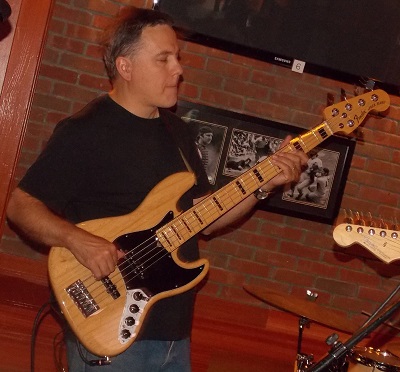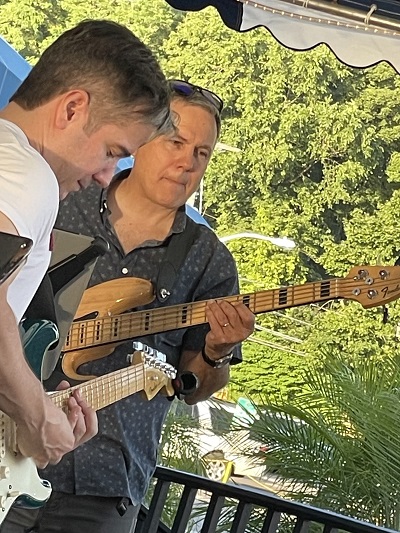
"Bass Master" Marshall Toppo Interview
www.MarshallToppo.com
Interview by Roger Zee (06/28/22)
Roger Zee: Who inspired you to take up the bass? Do you sing or play any other instruments?
Marshall Toppo: I started playing trumpet in elementary school and continued throughout high school. Along the way, I took a few piano lessons, but picked up the bass at around thirteen. The obvious influences and inspirations sprung from Paul McCartney, Bill Wyman, John Paul Jones, Larry Graham and John Entwistle. But as well, the unknown to me at the time bassists at Motown, Muscle Shoals, Wrecking Crew, etc. Then of course, Jaco came onto the scene in the mid-Ď70s and that raised the bar.
By the late Ď70s, I decided to make my 4-string Fender P-bass fretless as it had a nice maple neck and it sounded great. That decision wasnít so much influenced by Jaco, but by Mark Egan, who played bass in the early Pat Metheny Group, as well as his own group, Elements. For a few years I only played fretless bass! As I got older, other influences came from Marcus Miller, Tony Levin, Anthony Jackson, Chuck Rainey, and Lee Sklar. These guys didnít inspire me to pick up the bass, but definitely made me want to continue playing it!
RZ: Tell me about some of the musicians and groups you gigged and recorded with.
MT: I played and recorded with many local NY musicians. One of my oldest friends, Gil Parris, calls me frequently to sub whenever his steady bass player, and another old friend, Kip Sophos canít make a gig. I worked with Gil for ages and always have a blast. He always impresses me with his style, feel, and groove. And when Bernie Williams gets on the gig, not only does the music sound great, but Bernie and I can talk about IPAs!
Besides working on the club scene, I also play musicals/shows as a pit musician -- literally hundreds of them. Most recently: "Side Show," "Footloose," "Little Mermaid," "9 To 5," "Hairspray," "In The Heights," etc. Nothing glamorous there, but very particular skills that you need in the reading department. I also did national and international tours on that side of my resume -- "Cats" and "Jesus Christ Superstar." Itís great to keep a foot in both worlds.
RZ: What instruments/string/amps/mics do you currently use?
MT: As I said above, I started on a í69 Fender Precision that I installed a Jazz bass pickup near the bridge. This became my fretless. A few years after that, I bought a í69 Fender Jazz bass from a kid getting rid of it because, in his words, "I donít play Jazz!" This came fretted with a rosewood neck. A bass technician suggested that I swap the necks on the basses, which I thought absurd -- but did, and they stayed that way ever since.
More recently I acquired a Fender 5-string Jazz bass. I bought it new, and use it most of the time now. I also own an old Kay acoustic bass that I use for shows and Jazz gigs.
Strings? Whatever's on sale... I always use round wound on my electrics. Four-strings: 45 - 105. Five-strings: 45 - 130.
As for amps, I run two setups: a MarkBass ďLittle MarkĒ amp that I use with a 2-10Ē Epifani speaker cabinet. It provides a nice range of frequencies, just loud enough. My other setup's a Hartke KB12 Kickback amp. Thatís a work horse, and I use it for most pit shows or Jazz gigs.
Another old friend and bass player, Al Renino, suggested another great find --a JBL 1-15Ē PA speaker cabinet. Smaller than most cabinets of that time and I had grown tired of hauling my Hartke 4x12" around. It provides a lot of great low end. Al installed a tweeter on the front grill and the combination sounds great. I used my old Gallien-Kruger 800RB with the cabinet. Although I donít play it much any more, I still keep it on hand.
RZ: Talk about your home studio.
MT: I started arranging on a Roland sequencer with an Ensoniq keyboard. Am I dating myself yet? About twenty-five years ago I moved to a Mac based setup and use Cubase. Iím happy with it and donít want to switch as it does all the things that I need as an arranger. I donít want to re-start learning another system.
I can record small projects for singer-songwriters as well as for people who need scoring work. But donít bring a band here! For live audio, I use a Soundeluxe Large Diaphram Cardiod mic with great sound capture for voices, wind instruments, and guitars. I record this mic as well as bass and guitar through an old TL Audio Dual Valve mic preamp.
RZ: What and how do you practice?
MT: I try to practice whenever I can. Starting with warm-ups, then moving to more advanced techniques. Most of the time I practice for gigs where I need to learn the songs or parts. If itís a band job, I import the charts and convert to pdfs on an iPad Pro. For shows, they usually send me a digital copy of the bass book and I make edits and cuts on the iPad. Some gigs take a little bit of prep, others I practice for weeks.
RZ: Do you teach music privately?
MT: I donít anymore. I used to teach a full studio of students, but stopped doing that years ago. I now teach public elementary school music in Rye, NY.
RZ: How has the Pandemic affected you? What's on the horizon?
MT: Well, like everyone else, things came to an abrupt stop two years ago. However during the height of the lockdown, Gil Parris called me for a few gigs. I kidded him about being the ONLY musician working during the Pandemic! My yearly gigs got cancelled or postponed. It took a while to get back into the groove.
With respect to the horizon, things started opening up, and this past spring brought tons of gigs and work. Strange! I hope that it continues.
RZ: Describe your most special and/or unusual gig.
MT: Unusual? Too many! As for a special gig, a few years back I played in a band that they flew to a vineyard in the south of France for a New Yearís Eve party. They brought us over to rehearse for a week and wined and dined us for the entire stay. The gig went amazingly well. A very memorable one!
Unusual? The time I played with a Jazz trio in a biker bar comes to mind. Another fun night occurred when I played in a bar with an extremely loud guitarist. The bartender kept tapping me on the shoulder asking for "us" to turn down. This happened a few times, and by the fourth time, he stopped us and said, "get out!" I could keep going!
RZ: How do you see the future of the music business?
MT: Not a great outlook... But thereís work out there if you try. You need to get ready for what the gig asks for. There's live music all around if you look for it or even create the scene. As for music sales, record contracts, etc., that ship has mostly sailed. Which is why itís nice to see so many artists self-producing their music.
RZ: What advice do you give up-and-coming musicians?
MT: Two major things: LISTEN!! And play with dynamics! OK... Three things. You need to play with other musicians all the time. You cannot get better or develop a feel or good time practicing in your home to recordings. Mind you, that has its benefits, but you need to play with people.
RZ: Do you live with any animals?
MT: We sort of donít keep any animals as Iím allergic. However, my daughter, who doesnít live with us, keeps our
granddog named Atlas. We love him!
YouTube - "Club Number/Blackout" - From the "In the Heights" Pit
YouTube - "Boogie On Reggae Woman" - Brotet live at Garcia's 09/01/17
YouTube - "Courageous Cats" - Doug Monroe 1986
©2022 Roger Zee
Gil Parris, Marshall Toppo


